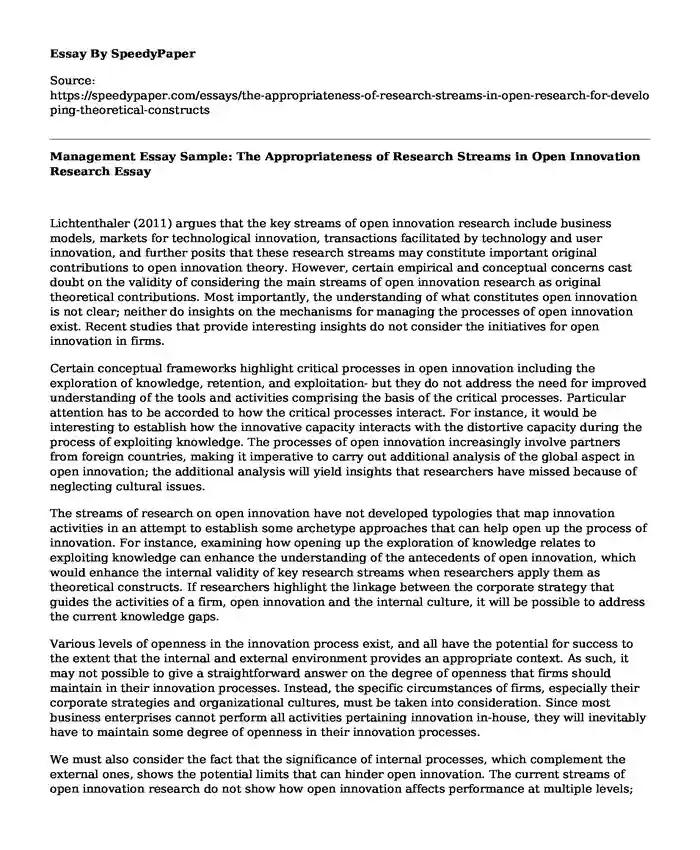
| Type of paper: | Essay |
| Categories: | Management |
| Pages: | 4 |
| Wordcount: | 854 words |
Lichtenthaler (2011) argues that the key streams of open innovation research include business models, markets for technological innovation, transactions facilitated by technology and user innovation, and further posits that these research streams may constitute important original contributions to open innovation theory. However, certain empirical and conceptual concerns cast doubt on the validity of considering the main streams of open innovation research as original theoretical contributions. Most importantly, the understanding of what constitutes open innovation is not clear; neither do insights on the mechanisms for managing the processes of open innovation exist. Recent studies that provide interesting insights do not consider the initiatives for open innovation in firms.
Certain conceptual frameworks highlight critical processes in open innovation including the exploration of knowledge, retention, and exploitation- but they do not address the need for improved understanding of the tools and activities comprising the basis of the critical processes. Particular attention has to be accorded to how the critical processes interact. For instance, it would be interesting to establish how the innovative capacity interacts with the distortive capacity during the process of exploiting knowledge. The processes of open innovation increasingly involve partners from foreign countries, making it imperative to carry out additional analysis of the global aspect in open innovation; the additional analysis will yield insights that researchers have missed because of neglecting cultural issues.
The streams of research on open innovation have not developed typologies that map innovation activities in an attempt to establish some archetype approaches that can help open up the process of innovation. For instance, examining how opening up the exploration of knowledge relates to exploiting knowledge can enhance the understanding of the antecedents of open innovation, which would enhance the internal validity of key research streams when researchers apply them as theoretical constructs. If researchers highlight the linkage between the corporate strategy that guides the activities of a firm, open innovation and the internal culture, it will be possible to address the current knowledge gaps.
Various levels of openness in the innovation process exist, and all have the potential for success to the extent that the internal and external environment provides an appropriate context. As such, it may not possible to give a straightforward answer on the degree of openness that firms should maintain in their innovation processes. Instead, the specific circumstances of firms, especially their corporate strategies and organizational cultures, must be taken into consideration. Since most business enterprises cannot perform all activities pertaining innovation in-house, they will inevitably have to maintain some degree of openness in their innovation processes.
We must also consider the fact that the significance of internal processes, which complement the external ones, shows the potential limits that can hinder open innovation. The current streams of open innovation research do not show how open innovation affects performance at multiple levels; this is an aspect that theoretical constructs should address clearly. Several reasons make it imperative for theoretical constructs in open innovation to address how making the innovation process open affects enterprise innovation and financial performance. When there is clear scientific evidence on the performance impact of open innovation, it will become credible as a significant research field.
Intensive analysis of performance effects of open innovation will enhance the level of understanding for firms that try to align their innovation processes in a manner that allows them to profit from investments in innovation activities. Extant research on open innovation has focused on its potential benefits while ignoring the attendant risks. For instance, firms can potentially benefit from shorter periods of development, although open innovation creates the risk of strengthening competing firms by selling secrets on competitive advantage during external knowledge exploration.
A further weakness in the streams of open innovation research is in the failure to take account of the contingent factors, within and without the firm, which moderate the relationship between open innovation and financial performance. For example, the regime for appropriation, and the markets for innovation, which vary significantly from industry to industry, can be important contingency factors in the firms environment. It is also important to note that extant research on open innovation does not provide insights on what determines the success of open innovation initiatives in a firm. When it comes to extracting the value of open innovation initiatives, considerable heterogeneity exists between firms, making it important to derive an in-depth understanding of the discrepancies that exist between firms.
The explanatory value of the theoretical constructs that will result from future research will increasingly rest on how researchers have undertaken a multilevel analysis of the factors that influence open innovation performance. At the individual level, the current streams of research on open innovation do not identify the antecedents of the successful management of open innovation processes. Current research does not also provide an understanding of the role of decision-making processes in enhancing the success of open innovation projects. When we look at the firm level, extant research on open innovation says little about the organizational capabilities that critical for the effective management of open innovation.
References
Lichtenthaler, U. (2011). Open innovation: Past research, current debates, and future directions. The Academy of Management Perspectives, 25(1), 75-93.
Cite this page
Management Essay Sample: The Appropriateness of Research Streams in Open Innovation Research. (2019, Dec 13). Retrieved from https://speedypaper.net/essays/the-appropriateness-of-research-streams-in-open-research-for-developing-theoretical-constructs
Request Removal
If you are the original author of this essay and no longer wish to have it published on the SpeedyPaper website, please click below to request its removal:
- Free Essay on The Rise of Telemachus to Become Worth of the Title Prince
- MBA Personal Statement, Free Example for Everyone
- Air Pollution Essay Sample
- Marketing Essay Example: Advertising Tools in IMC Plans
- Free Essay for Students: Evolution Versus Intelligent Design
- Free Essay Sample about Students' Assessment
- Essay Sample on Zika Virus Infection
Popular categories




